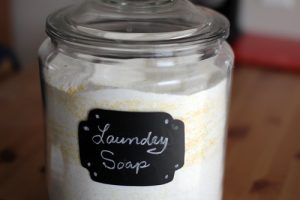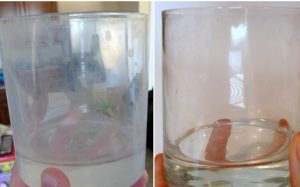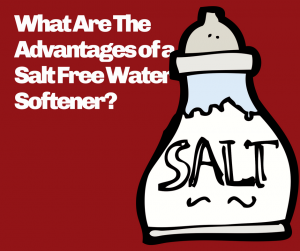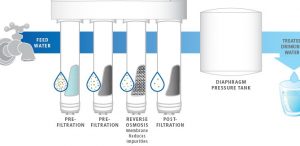“Honey, where’s my white shirt? All these are gray.”
“Why do my dishes have grimy spots on them?”
“Ewwww! Are you sure these towels are clean?”
“Mom, why is my skin so itchy?”
“Wow! I just washed my hair and it looks so dull!”
If you’ve been experiencing any of these problems, there could be a connection. These could all be signs that you need a water softener system.
What is hard water and how does it affect me?
This is a common question. Most households in the USA run on hard water supplies, meaning their water has fairly concentrated amounts of magnesium and calcium. The excess amount of these minerals in your water can lead to pesky problems. What kind of problems? Glad you asked.
Hard water problems

Plumbing damage
They also cause scaling–residual deposits of calcium and magnesium on your sink, tub, and toilet. Even your dishes look dingy and spotted when rinsed with hard water.
Ugly as it is, the scaling deposits you see are the least of your problems. The more troublesome and potentially costly issue is the damage they cause to your home’s plumbing. Excess magnesium and calcium can build up deposits inside the plumbing of your house and cause major problems if left untreated. As every homeowner knows, plumbing repairs don’t come cheap.
So, what is a Water Softener and how can it help?
A water softener is a device or system that removes the excess minerals (mostly magnesium and calcium) and other impurities from hard water Having a water softening system in your home not only leaves your dishes looking spotless, but also dramatically extends the life of your plumbing, your boiler, your water heater tank, your dishwasher, your washing machine, and any other water-using appliances.
There are several types of water softeners on the market. The trick is finding which one will best suit your specific household needs. Although a basic ion exchange system is most common, a salt-free water softener might work better for someone who needs to cut down on sodium. Other types of systems available include: a magnetic/ anti-scale system or a reverse osmosis system.
Each individual water softening system brings something different to the table.
Why Invest in a Water Softening System
Think about it. You really can’t go wrong investing in a water softening system.
- No more dirty-looking, grimy-looking, splotchy dishes.
- No more faded, rough, itchy clothes.
- Certainly, no more irritated, dry skin or dull hair.
- Last, but definitely not the least beneficial– remember soft water also increases the life expectancy of your plumbing and water-using appliances.
OK. I’m sold. Now what?
As mentioned above, each water softening system works differently. Be sure to do the research before purchasing. You want to make sure your investment is right for you and your family. Remember, the variety of systems available means that there is a water softener for everyone’s needs. All it takes is a little time and research to find the perfect one.
How We Can Help
Don’t get discouraged if the perfect one isn’t found immediately. The water softener professionals here at Knoxville Water Treatment know just how to help you narrow down the choices and get the type and model of system that will meet your family’s unique needs. Not only can we help you find the right system, we’ll even install it for you.
What are you waiting for? Contact us today!
The post You might need a water softener if… appeared first on KNOXVILLE WATER TREAMENT | Water filters & Softeners | Water Purification Systems.
source http://knoxvillewatertreatment.com/you-might-need-a-water-softener-if/


 The initial cost for purchasing a water softener can range anywhere from a few hundred dollars to a few thousand dollars. Most water softeners are salt based, so not only are you buying the unit, but you will also have to continually purchase salt for the water softener. The most popular types of systems also require regular maintenance.
The initial cost for purchasing a water softener can range anywhere from a few hundred dollars to a few thousand dollars. Most water softeners are salt based, so not only are you buying the unit, but you will also have to continually purchase salt for the water softener. The most popular types of systems also require regular maintenance.

 it comes with a catch. An AMT doesn’t remove hard water chemicals, it just alters their composition, so they won’t leave as much “scale” effects on dishes. This option does not prevent buildup in water-using appliances where water stays for up to forty-eight hours, such as a hot water heater. There is also less scientific evidence that this method works efficiently and effectively.
it comes with a catch. An AMT doesn’t remove hard water chemicals, it just alters their composition, so they won’t leave as much “scale” effects on dishes. This option does not prevent buildup in water-using appliances where water stays for up to forty-eight hours, such as a hot water heater. There is also less scientific evidence that this method works efficiently and effectively.